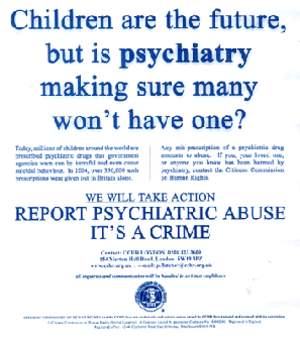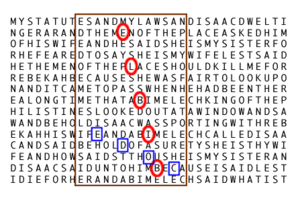I've been thinking more about Gary Mannion, and folk like him. A notion that is widepread in new age and magical thinking is that we are all following "paths"1; that we are given a set of experiences or a lesson to learn and sent on our way, and it is our duty to construct a worldview based on those experiences, to take onboard whatever purpose our three score and ten is supposed to teach us. This idea, in part, stems from certain notions - that reality is subjective, and that all viewpoints are equally valid. So lets deal with those two first.
Reality is not subjective. Our perception of reality, it could be argued, is subjective, but evidence abounds for reality's refusal to be bound by our perception - from
the guy who walks into (and not through) a patio door he perceives to be open to clinical trials that overturn perceptions about blood-letting, or even our understanding of the way that diseases are carried. Perceptions of reality can indeed be subjective; I doubt there's a child alive who hasn't at some point toyed with the notion that what one person perceives as the color red is not the same thing that someone else perceives as red. But this is just a difference in perception; we have no innate control over the way we perceive the world. Many illusions still have the power to fool us even when we know we are being fooled, such as the so-called
Thatcher Effect. When we perceive, we create in a fantastically sophisticated and complex way a mental model of the universe as we perceive it. But it's important to understand that this model is created by information flowing from the universe as it really exists, through our senses, before being thrown up in a necessarily corrupted and incomplete fashion in the theater of our mind. At no point does the information flow from the model to the universe. We cannot vividly imagine an apple, say, and have that apple genuinely appear before us. Even if we see that apple, we know it isn't there the moment we pick it up and offer it to somebody else.
New age readers at this stage may be reaching for their copies of
The Secret. I refer you, also, to the previous
Beacon post on cosmic ordering. Even if the universe did bend to our will in this way, it would take the form of external communication; the universe bends to our will to no greater extent that K-Mart bends to our shopping list.
If we take this on board, then it knocks a hole in the second idea; that all viewpoints are equally valid. Again, they are not. This might hold water in more illusory fields, such as English literature or art criticism, but only because we are faced with notions of constructing meaning from oblique sources, and variant readings of texts do not effect what was intended by the author. And even here, it is clear that some readings are more worthy than others.
To take something realworld, that is more on-topic, look at evolution vs. creationism2. Here we have a theory that is based on empirical evidence that presents a coherent picture of the origin of the species; it describes the world. It has found itself in conflict with creationism, which cannot even be described as a theory inasmuch as it is not based on evidence but on a kind of black hole of reasoning. It is difficult to explain the complexities of life on earth, therefore we kick the question to a place that we cannot go, handing creation to an entity that is all-powerful and sits outside of such logical constraints as those posed by the question "what created the creator". At best, these two ideas are poles apart; one is scientific, in that it is based on evidence and on a progression of ideas, the other is not scientific. Creationism comes nowhere near balancing the scales, and yet there are those who insist "in the interests of balance" that it be taught alongside evolution in the science classroom. That would be akin to teaching flat earth theory in geography, or holocaust denial in history. These ideas are lacking in validity.
So where does that leave us. It leaves us with the uncomfortable truth that whatever ideas we have in our head, some of them will have validity and some of them won't. The idea of personal integrity being about honouring the ideas we have seems to be flawed. It's not personal integrity but ideological integrity, which is a different kettle of fish. In essence, by blindly honouring our ideas in the face of contradictory evidence is the opposite of personal integrity; we dishonour ourselves by not testing our beliefs strongly enough.
But this is a normal human trait. That model of the universe we have is based to a fair degree on "heuristics", on logical shortcuts that aren't 100% accurate but make it possible for us to function more efficiently in the world. To cite an oft-used example, we do not feel the need to test the sidewalk before we walk on it each time. Heuristics tells us that the sidewalk is solid, and that it will take our weight. Heuristics tells us that its state has not changed since we last walked on it, and that it does not differ in any meaningful way from any other sidewalk we have encountered. So it's great for the sidewalk, but not so helpful when dealing with the ineffable. It's not even so great when dealing with medicine. I take such and such a pill; my headache clears. There's a corelation there that we are quick to interpret as cause, but it aint necessrily so, and is not something that can be determined by carrying on taking the pills; stopping taking the pills; or switching pills. The same goes for faith healing and lucky briefs.
I was fortunate enough to go along to a demonstration of mediumship recently. The medium did not fair very well, perhaps as a result of not being in front of an audience that was invested in receiving messages from beyond the grave. I suspect the majority of the people attending were there to see the medium rather than hear from Nanny Johnson. I've seen cold reading before, and felt that that was all that was taking place. I've posted before on my belief that it is perfectly possible for people to learn to cold read without knowing that that is the method they are using. When developing one's ability in this field, one is presented with hits and misses, but the process itself remains mysterious. We receive waves of information; images, words, voices, and over time develop the ability to discern in that noise the particular pieces of information that are more likely to hit home with someone in the audience.
Following the demonstration was a Q&A. Someone raised a question that wasn't really answered fully. How does the medium know when he is receiving information from the other side; how does he tell the difference between that and plain guesswork. I suspect that he can't, because he has shifted his perception of what guesswork is. He has defined it as spirit communication, presented it as such, and surrounded himself with people who are invested in that reality. Like Garry, it will become increasingly rare that he encounters data that challenges his view of what he does. Because of the environment that he has built around himself, he will become increasingly convinced that the patio door is open; will reach such a level of certainty that he never feels the need to prove this perception by attempting to step out into the garden.
There is a skeptic mantra which is "extraordinary claims require extraordinary proof". I feel the real definition of personal integrity is to realise that the claims you are making are extraordinary, and to go in search of extraordinary proof. Test your abilities, and test them properly. Test your tests. Not only do you owe it to the people you present your skills to, but you owe it to yourself.
1It's important to note, here, how passive the notion of "life paths" is in the first place. We do not blaze our own trail, we follow some predetermined route to which we are either oblivious or meekly a slave to. To think of our lives as paths we are forced to follow renounces a fair amount of personal responsibility.
2At the risk of boring people, creationism seeks to describe the origin of life, evolution seeks to explain biodiversity, so these ideas are not necessarily incompatible outside of Genesis.


![Reblog this post [with Zemanta]](http://img.zemanta.com/reblog_e.png?x-id=d701a327-7307-44c1-aba6-e98f34187fe0)







